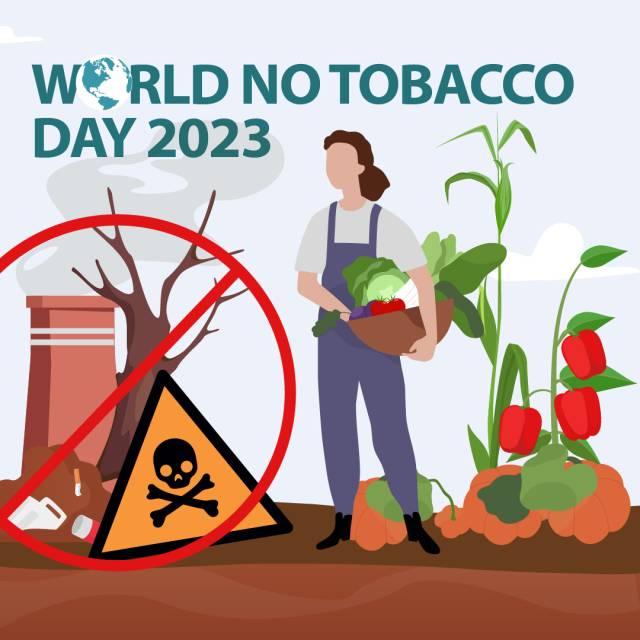You are here
World No Tobacco Day Highlights Impact of Tobacco on Global Food Systems
Though tobacco has devastating consequences on public health and agriculture around the world, a report by the World Health Organization (WHO) cites that nearly 10 million acres of land are under tobacco cultivation globally. On May 31, 2023, which is World No Tobacco Day, WHO launched a global campaign titled “We need food, not tobacco,” the calling upon governments to end subsidies for tobacco growing and use savings for crop production.
According to WHO, tobacco production contributes to the global food crisis by destroying fertile land that could otherwise be used for agriculture, exacerbating food shortages already impacted by global drought, soil nutrient depletion, political conflict and transmission of communicable diseases. In 2021, a total of 828 million people around the world were affected by hunger, with 924 million people experiencing severe food insecurity. Lands diverted to tobacco farming could otherwise have been used for food agriculture, potentially alleviating a portion of the global hunger burden.
In addition to harming global food systems, tobacco production also impacts the health of tobacco farmers. Research indicates that direct exposure to tobacco and related pesticides is associated with numerous symptoms, including headaches, dizziness, vomiting, shortness of breath, muscle weakness and skin rashes.
Despite the global need for food, tobacco is often the crop of choice because farmers believe it is the only economically viable option, and many are unwilling to substitute tobacco for other crops. Additionally, WHO reports that farmers are also often under contracts that leave them indebted to tobacco companies. To escape these cycles of debt and break free from the tobacco industry, farmers must be given alternative opportunities for diversified profits.
Surveillance is essential to understanding tobacco economics, including consumer tobacco use and motivations, to allow for strategic implementation of alternative crop programs. As a partner in the Bloomberg Initiative to Reduce Tobacco Use, the CDC Foundation builds public-private partnerships to promote opportunities for global tobacco control surveillance and monitoring. The CDC Foundation works in collaboration with the U.S. Centers for Disease Control and Prevention (CDC), WHO and other international partners to implement components of the Global Tobacco Surveillance System (GTSS), comprised of the Global Adult Tobacco Survey (GATS), the Global Youth Tobacco Survey (GYTS), Tobacco Questions for Surveys (TQS) and Tobacco Questions for Surveys of Youth (TQS-Youth).
In particular, GATS is a global standard for systemically monitoring adult tobacco use and assessing progress on key tobacco indicators. Collecting data through a household survey of adults aged 15 years and older using a standardized core questionnaire, sample design, data collection methods and management procedures, GATS sheds light on the economic factors of tobacco use, including work status, tobacco products used and tobacco use behaviors. GATS data can be used to help countries develop informed policies and priorities that can protect its population and land.
CDC and the CDC Foundation will host a webinar on June 5, 2023, that will feature speakers from the GATS teams in the Philippines and South Africa and representatives from WHO regional offices. The presenters will share their experiences with conducting GATS and releasing their data and their plans to use the data and highlight their 2023 World No Tobacco Day campaigns.
We invite you to register for the webinar to learn more about global tobacco surveillance in recognition of World No Tobacco Day. You can find more information and downloadable social media posts from this year’s World No Tobacco Day theme “We need food, not tobacco” on GTSS Academy.

